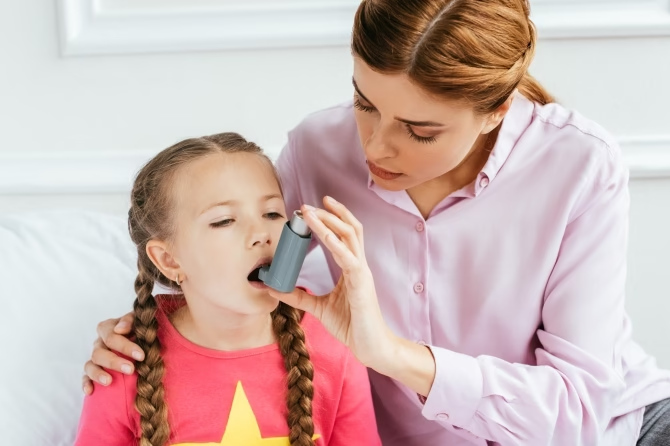Asthma in Toddlers: When to Go to Hospital
Childhood asthma is one of the most common chronic conditions affecting young children worldwide. While many toddlers experience occasional wheezing or coughing, asthma is different—it involves long-term inflammation of the airways in the asthma lungs, making breathing difficult.
Parents often wonder when they should treat asthma symptoms at home and when it’s time to head to the hospital. Knowing the difference can help prevent emergencies and give your child the right care at the right time.
Understanding Childhood Asthma
Asthma in toddlers happens when the small airways in the lungs become inflamed and narrowed. This makes asthma breathing harder and can trigger coughing, wheezing, and shortness of breath. Unlike a common cold, asthma is a chronic condition that requires ongoing asthma control to keep symptoms manageable.
Asthma Causes in Toddlers
There isn’t one single cause of asthma, but several factors can trigger or worsen it:
- Allergens: Dust mites, pollen, mold, or pet dander.
- Respiratory infections: Viral colds and flu often trigger asthma symptoms.
- Irritants: Smoke, pollution, or strong odors.
- Genetics: Children with asthmatic parents are more likely to develop it.
- Weather changes: Cold air can sometimes spark asthma breathing issues.
Common Asthma Symptoms in Toddlers
Asthma can be tricky to recognize in very young children, but common signs include:
- Frequent coughing, especially at night
- Wheezing (a whistling sound while breathing)
- Rapid breathing or shortness of breath
- Chest tightness or discomfort
- Fatigue during play due to lack of oxygen
If your toddler experiences these symptoms often, they may need an evaluation for childhood asthma.
When to Go to the Hospital
Asthma can sometimes escalate quickly into an emergency. Take your toddler to the hospital immediately if you notice:
- Difficulty breathing – Your child is struggling to breathe, using chest and neck muscles with every breath.
- Bluish lips or face – Indicates a lack of oxygen.
- Inability to speak or eat – If asthma symptoms prevent basic activities.
- Rapid worsening – Rescue inhaler or prescribed medication doesn’t relieve symptoms.
- Severe wheezing and coughing – Especially if it continues despite treatment.
These may be signs of a severe asthma attack that requires urgent medical attention.
Asthma Attack Treatment at Home
If symptoms are mild, parents can often manage with the child’s prescribed action plan. Common asthma attack treatments include:
- Using a rescue inhaler with a spacer for toddlers.
- Keeping your child calm, as panic worsens asthma breathing.
- Avoiding known triggers like smoke or dust.
However, if treatment does not help within 15–20 minutes, seek medical help right away.
Long-Term Asthma Control and Prevention
Managing childhood asthma requires more than just treating attacks. Parents should focus on long-term asthma prevention and control:
- Regular checkups – Work with your pediatrician to adjust medications as your child grows.
- Identify triggers – Keep a diary of what sparks asthma symptoms and avoid them when possible.
- Healthy lifestyle – Balanced diet, exercise, and good sleep strengthen the immune system.
- Allergen management – Use air filters, wash bedding weekly, and keep pets out of bedrooms.
Is There a Cure for Asthma?
Currently, there is no permanent cure for asthma. However, with proper management, children can live normal, active lives. Many asthmatics see symptoms lessen as they grow older, though some continue to need treatment into adulthood.
Helping Your Toddler Cope
Parents can support their toddlers by:
- Teaching them to recognize early signs of asthma symptoms.
- Making inhaler use a routine part of their day.
- Encouraging safe play and exercise under supervision.
Remember, most children with asthma thrive with the right care.
Final Thoughts
Asthma in toddlers can be frightening, especially during flare-ups. The key is knowing the warning signs and when to seek emergency care. With proper asthma control, lifestyle adjustments, and regular medical support, your child can stay healthy and active.
Always follow your pediatrician’s advice and never hesitate to go to the hospital if your toddler’s asthma breathing worsens quickly. Acting early can make all the difference.
